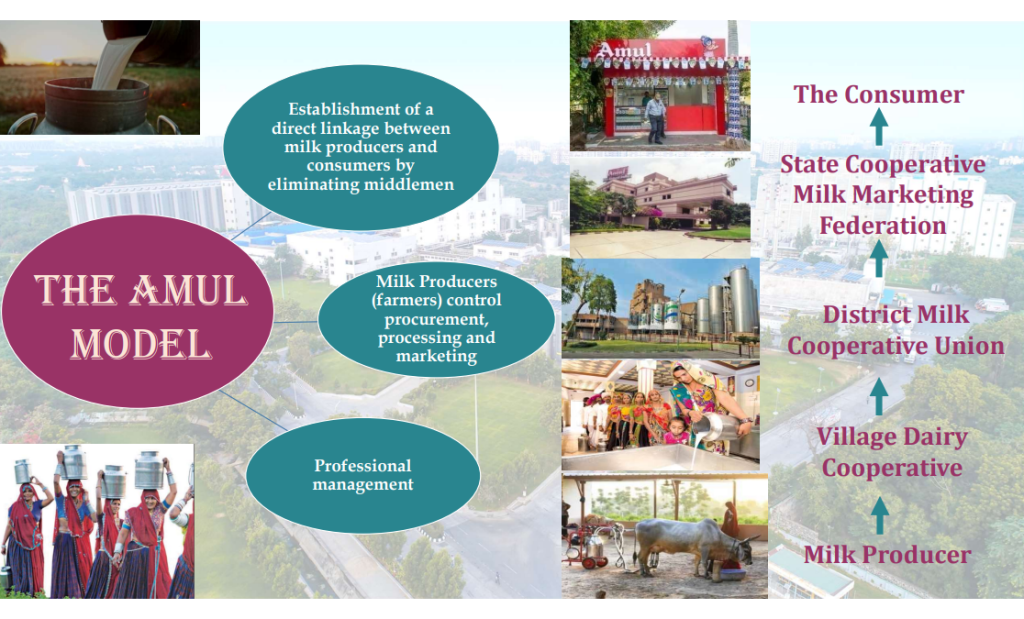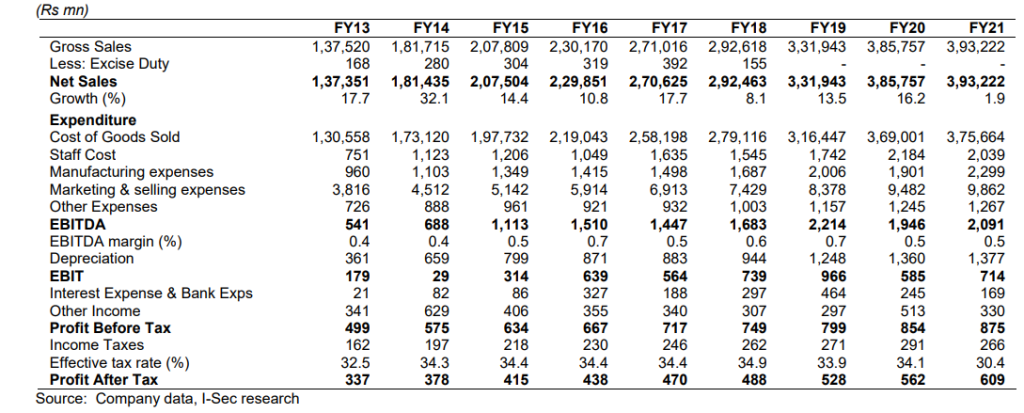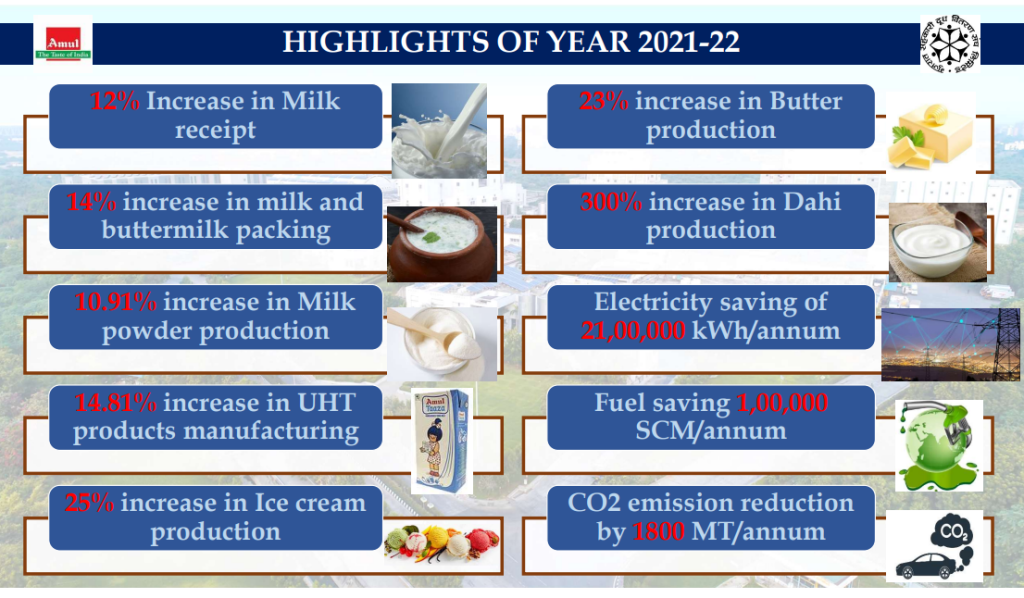Before we dive deep into the SWOT analysis, let’s get the business overview of Amul. Amul, or Anand Milk Union Limited, is an Indian dairy cooperative founded in 1946, headquartered in Anand, Gujarat, India. It is one of the largest dairy organizations in the world, producing and marketing a wide range of dairy products, including milk, butter, cheese, yogurt, ice cream, and more.
Amul’s cooperative model is designed to empower local farmers, with over 3.6 million milk producers being part of the cooperative system. The cooperative model allows these farmers to pool resources and collectively market their products under the Amul brand. Amul is managed by the Gujarat Cooperative Milk Marketing Federation Ltd. (GCMMF), which the milk producers own.
Amul has been a pioneer in the Indian dairy industry, implementing innovative strategies in milk production, processing, and marketing. Its White Revolution, or Operation Flood, launched in the 1970s, transformed India from a milk-deficient country to the world’s largest milk producer.

Amul’s product range covers a variety of dairy products, including:
- Milk and milk-based beverages: Pasteurized milk, flavored milk, buttermilk, and more.
- Butter: Amul is best known for its butter, which has become a household name in India.
- Cheese: Amul offers a range of cheese products, including processed cheese, mozzarella, cheddar, and more.
- Ice cream: Amul offers diverse ice cream flavors and products.
- Yogurt: Amul offers different types of yogurt, including traditional dahi, flavored yogurt, and probiotic yogurt.
- Ghee: Amul ghee is another popular product in the Indian market.
- Chocolates: Amul also offers a range of chocolates, including milk chocolates, dark chocolates, and fruit and nut varieties.
Amul’s strong distribution network makes its products available to consumers across India and in more than 50 countries worldwide. The organization also invests in research and development to continue to innovate and provide quality products to its customers.
Financial Performance: Amul achieved a turnover of Rs. 55,070 crores (USD 7 billion) during the year 2022-23, implying growth of 18.5%.

Here is the SWOT analysis for Amul
A SWOT analysis is a strategic planning tool used to evaluate the Strengths, Weaknesses, Opportunities, and Threats of a business, project, or individual. It involves identifying the internal and external factors that can affect a venture’s success or failure and analyzing them to develop a strategic plan. In this article, we do a SWOT Analysis of Amul.
SWOT Analysis: Meaning, Importance, and Examples
Strengths
- Cooperative model: Amul’s cooperative model empowers small-scale farmers by pooling their resources and providing a platform to market their products collectively. This approach helps ensure a stable livelihood for millions of farmers and enables Amul to maintain a consistent supply of raw materials.
- Strong brand recognition: Amul has established itself as a trusted and reliable brand. Its brand recognition extends beyond India, reaching consumers in more than 50 countries worldwide.
- Diverse product portfolio: Amul offers a wide range of dairy products catering to various consumer preferences and needs. This diversified product portfolio allows the company to tap into different market segments and reduces its dependency on a single product line.
- Extensive distribution network: Amul’s vast distribution network ensures its products are easily accessible to consumers across India, even in remote areas. This network helps the company maintain a strong presence in the market and provides a competitive advantage over other dairy players.
- Focus on quality and innovation: Amul invests heavily in research and development to maintain high-quality standards and develop new products. The company’s commitment to innovation has allowed it to stay ahead of its competitors and continuously expand its product offerings.
- Economies of scale: Amul’s large scale of operations enables it to achieve cost efficiencies, allowing it to offer its products at competitive prices. This pricing advantage makes Amul’s products more accessible to a broader consumer base.
- Proven success in rural development: Amul’s business model has been instrumental in transforming the socio-economic landscape of rural India. The company has successfully uplifted millions of farmers’ lives and contributed to overall rural development.
- Adoption of digital technologies: Amul has embraced digital transformation to improve its supply chain management, customer engagement, and e-commerce operations. The company can further streamline its processes and expand its reach by leveraging technology.
Weaknesses
- Dependence on the cooperative model: Amul’s business success largely relies on the cooperative model, which requires effective collaboration and coordination among millions of farmers. Any disruption in this model, such as internal conflicts or mismanagement, could affect the company’s supply chain and overall performance.
- Limited presence in non-dairy segments: Although Amul has a diverse product portfolio within the dairy industry, its presence in non-dairy segments is relatively limited. This may restrict the company’s growth potential, particularly in markets where non-dairy products are in high demand.
- Intense competition: Amul faces stiff competition from both local and international dairy brands. The increasing number of players in the Indian dairy industry could impact Amul’s market share and growth prospects.
- Perishable nature of products: Dairy products are perishable, which means they have a limited shelf life. This requires Amul to maintain an efficient supply chain and distribution network to ensure that products reach consumers on time, which can be challenging and resource-intensive.
- Vulnerability to fluctuations in raw material prices: Amul’s operations rely on the steady supply and pricing of raw materials, particularly milk. Fluctuations in milk prices due to seasonal variations or changing production costs can affect the company’s profitability.
- Regulatory challenges: The dairy industry in India is subject to stringent regulations, including those related to food safety, animal health, and environmental sustainability. Changes in regulatory requirements can impose additional costs and challenges for Amul’s business operations.
- Reliance on the Indian market: While Amul has expanded its presence to over 50 countries, its core market remains India. This reliance on a single market can make the company vulnerable to local economic and political factors affecting consumer demand and purchasing power.

Opportunities
- Expanding into non-dairy segments: Amul can diversify its product portfolio by exploring non-dairy alternatives, such as plant-based milk, vegan cheese, and other products that cater to the growing demand for healthier and more sustainable food options.
- Targeting health-conscious consumers: With increasing consumer awareness about health and nutrition, Amul can tap into this market by offering functional benefits, such as fortified milk, probiotic yogurt, and low-fat dairy options.
- Growing demand for value-added dairy products: Amul can capitalize on the rising demand for value-added dairy products, such as cheese, yogurt, and flavored milk, by expanding its product range and enhancing its marketing efforts to target new consumer segments.
- Leveraging e-commerce platforms: Amul can further expand its reach by strengthening its presence on e-commerce platforms and offering online-exclusive products and promotions. This will enable the company to reach a broader customer base and cater to the growing trend of online shopping.
- Expanding international presence: Amul can expand its presence in global markets, particularly in regions with a large Indian diaspora, by establishing local production facilities or forming strategic partnerships with local distributors and retailers.
- Investing in research and development: By investing in R&D, Amul can develop innovative products and packaging solutions that cater to changing consumer preferences and address emerging market trends, such as sustainability and environmentally-friendly packaging.
- Strengthening farmer support and training programs: Amul can further enhance its cooperative model by investing in capacity-building programs for farmers, providing them with training, resources, and support to improve their productivity, animal welfare, and environmental sustainability practices.
- Collaborations and acquisitions: Amul can explore opportunities to collaborate with or acquire other companies in the food and beverage industry, enabling it to diversify its product offerings, enter new markets, and gain access to additional resources and expertise.
Threats
- Intense competition: The dairy industry is highly competitive, with both local and international players vying for market share. Increased competition can lead to price wars, reduced margins, and loss of market share for Amul.
- Changing consumer preferences: With growing health awareness and increasing demand for non-dairy alternatives, Amul may face challenges in retaining its market share if it cannot adapt to these changing consumer preferences and develop new products accordingly.
- Fluctuations in raw material prices: Amul’s operations rely heavily on the availability and pricing of raw materials, particularly milk. Volatility in milk prices due to climate change, animal diseases, or production costs can negatively impact the company’s profitability.
- Regulatory challenges: The dairy industry is subject to stringent regulations, including those related to food safety, animal health, and environmental sustainability. Any changes in regulatory requirements can impose additional costs and challenges for Amul’s business operations.
- Supply chain disruptions: Amul’s supply chain is vulnerable to disruptions caused by factors such as natural disasters, political unrest, or transportation issues. Such disturbances can lead to shortages of raw materials or delays in product delivery, which can adversely affect the company’s operations and reputation.
- Quality control issues: Maintaining consistent product quality is crucial for Amul’s brand reputation and customer loyalty. Any lapses in quality control can result in product recalls or damage to the company’s brand image, which can have long-term consequences.
- Climate change and environmental concerns: Climate change and its associated impacts, such as water scarcity and extreme weather events, can affect the dairy industry by disrupting milk production and supply. Amul must also address growing concerns about the environmental footprint of the dairy industry, including issues related to greenhouse gas emissions, water usage, and waste management.











